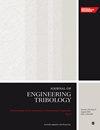The size effect of molybdenum disulphide additives on friction and wear performance of lithium-thickened palm olein grease
IF 1.8
3区 工程技术
Q3 ENGINEERING, MECHANICAL
Proceedings of the Institution of Mechanical Engineers, Part J: Journal of Engineering Tribology
Pub Date : 2023-11-20
DOI:10.1177/13506501231214928
引用次数: 0
Abstract
Concern over commercial mineral-based grease’s impact on the environment and its unrenewable resources requires a more sustainable alternative in lubrication. In this research, a palm olein-based grease was developed, and the effect of particle size of molybdenum disulphide (MoS2) additives on the grease performance was experimentally evaluated. Molybdenum disulphide additive of 0.5 wt.% concentration that varied in size was added to the palm olein grease. The friction reduction and wear characteristics of the developed lubricants were evaluated using a four-ball tribometer. The wear surfaces were analyzed by scanning electron microscope, energy dispersive spectroscopy and infinite focus microscope. It was discovered that MoS2 improved the grease performance, and a nano size of 90 nm exhibited the best performance in reducing friction coefficient, wear parameters and surface roughness. This study suggests the potential of palm olein-based grease with MoS2 additive to be used as a lubricant.二硫化钼添加剂对锂稠棕榈油润滑脂摩擦和磨损性能的影响
人们担心商用矿物基润滑脂对环境的影响及其不可再生的资源,因此需要一种更具可持续性的润滑油替代品。本研究开发了一种棕榈油基润滑脂,并通过实验评估了二硫化钼(MoS2)添加剂的粒度对润滑脂性能的影响。在棕榈油基润滑脂中添加了不同粒度的二硫化钼添加剂,浓度为 0.5 wt.%。使用四球摩擦仪评估了所开发润滑剂的减摩和磨损特性。通过扫描电子显微镜、能量色散光谱仪和无限聚焦显微镜对磨损表面进行了分析。结果发现,MoS2 提高了润滑脂的性能,而纳米尺寸为 90 纳米的润滑脂在降低摩擦系数、磨损参数和表面粗糙度方面表现最佳。这项研究表明,含有 MoS2 添加剂的棕榈油基润滑脂具有用作润滑剂的潜力。
本文章由计算机程序翻译,如有差异,请以英文原文为准。
求助全文
约1分钟内获得全文
求助全文
来源期刊

CiteScore
4.20
自引率
5.00%
发文量
110
审稿时长
6.1 months
期刊介绍:
The Journal of Engineering Tribology publishes high-quality, peer-reviewed papers from academia and industry worldwide on the engineering science associated with tribology and its applications.
"I am proud to say that I have been part of the tribology research community for almost 20 years. That community has always seemed to me to be highly active, progressive, and closely knit. The conferences are well attended and are characterised by a warmth and friendliness that transcends national boundaries. I see Part J as being an important part of that community, giving us an outlet to publish and promote our scholarly activities. I very much look forward to my term of office as editor of your Journal. I hope you will continue to submit papers, help out with reviewing, and most importantly to read and talk about the work you will find there." Professor Rob Dwyer-Joyce, Sheffield University, UK
This journal is a member of the Committee on Publication Ethics (COPE).
 求助内容:
求助内容: 应助结果提醒方式:
应助结果提醒方式:


